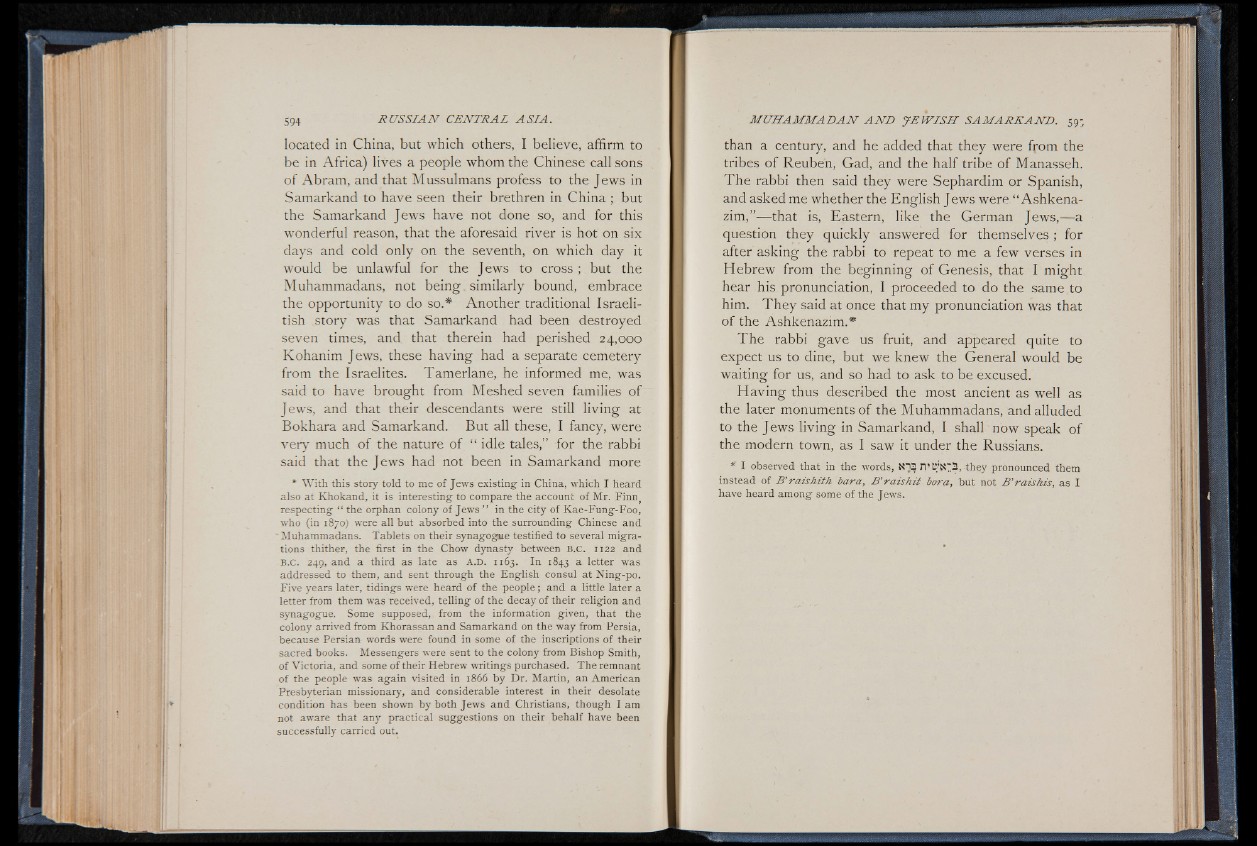
located in China, but which others, I believe, affirm to
be in Africa) lives a people whom the Chinese call sons
of Abram, and that Mussulmans profess to the Jews in
Samarkand to have seen their brethren in China ; but
the Samarkand Jews have not done so, and for this
wonderful reason, that the aforesaid river is hot on six
days and cold only on the seventh, on which day it
would be unlawful for the J ews to cross ; but the
Muhammadans, not being. similarly bound, embrace
the opportunity to do so.* Another traditional Israeli-
tish story was that Samarkand had been destroyed
seven times, and that therein had perished 24,000
Kohanim Jews, these having had a separate cemetery
from the Israelites. Tamerlane, he informed me, was
said to have brought from Meshed seven families of
Jews, and that their descendants were still living at
Bokhara and Samarkand. But all these, I fancy, were
very much of the nature of “ idle tales,” for the rabbi
said that the Jews had not been in Samarkand more
* With this story told to me of J ews existing in China, which I heard
also at Khokand, it is interesting to compare the account of Mr. Finn
respecting “ the orphan colony of Jews ” in the city of Kae-Fung-Foo,
who (in 1870) were all hut absorbed into the surrounding Chinese and
• Muhammadans. Tablets on their synagogue testified to several migrations
thither, the first in the Chow dynasty between B.C. rr22 and
B.C. 249, and a third as late as A.D. 063. In 1843 a letter was
addressed to them, and sent through the English consul at Ning-po.
Five years later, tidings were heard of the people; and a little later a
letter from them was received, telling of the decay of their religion and
synagogue. Some supposed, from the information given, that the
colony arrived from Khorassan and Samarkand on the way from Persia,
because Persian words were found in some of the inscriptions of their
sacred books. Messengers were sent to the colony from Bishop Smith,
of Victoria, and some of their Hebrew writings purchased. The remnant
of the people was again visited in 1866 by Dr. Martin, an American
Presbyterian missionary, and considerable interest in their desolate
condition has been shown by both Jews and Christians, though I am
not aware that any practical suggestions on their behalf have been
successfully carried out.
than a century, and he added that they were from the
tribes of Reuben, Gad, and the half tribe of Manasseh.
The rabbi then said they were Sephardim or Spanish,
and asked me whether the E nglish J ews were ‘ ‘ Ashkena-
zim,”— that is, Eastern, like the German Jews,— a
question they quickly answered for themselves ; for
after asking the rabbi to repeat to me a few verses in
Hebrew from the beginning of Genesis, that I might
hear his pronunciation, I proceeded to do the same to
him. They said at once that my pronunciation was that
of the Ashkenazim.*
The rabbi gave us fruit, and appeared quite to
expect us to dine, but we knew the General would be
waiting for us, and so had to ask to be excused.
Having thus described the most ancient as well as
the later monuments of the Muhammadans, and alluded
to the Jews living in Samarkand, I shall now speak of
the modern town, as I saw it under the Russians.
* I observed that in the words, n'EW'.3 , they pronounced them
instead of B'raishith bara, B 'ra ish it bora, but not B ’raishis, as I
have heard among some of the Jews.